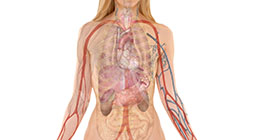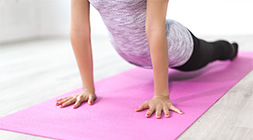
Overview
Symptoms
Causes
Prescription
Health Tips
Bronchitis occurs when the main air passages of the lungs, the bronchi, become inflamed. Acute bronchitis appears within a few days following a viral infection or cold and typically lasts two to four weeks. Secondary bacterial infections such as pneumonia may also occur in the elderly, smokers, people with weak immune systems, and those with heart disease. Chronic bronchitis, a form of chronic obstructive pulmonary disease (COPD), develops over time, is long term and largely a result of smoking or due to other airborne agents such as chemicals or noxious fumes. Many with chronic bronchitis will subsequently develop emphysema.
Symptoms
Symptoms of chronic bronchitis vary and may come and go:
- Blocked or runny nose
- Fatigue
- Feeling heaviness or pain in chest
- Fever and chills
- Green or yellow mucous when coughing
- Irritating, persistent cough
- Shortness of breath
- Sore throat
- Wheezing and shortness of breath, especially after coughing
Causes
Acute bronchitis occurs when respiratory viral infections such as the rhinovirus (common cold) flourish in the respiratory tract and attack the bronchi. Less commonly, bacteria such as Chlamydia pneumoniae, Mycoplasma pneumoniae and Streptococcus pneumoniae, are responsible for bronchitis. Exposure to chemicals, noxious fumes, or asthmatic reactions may injure and inflame the bronchial wall causing bronchitis.
Smoking is the cause of 80–90 percent of all chronic bronchitis cases. Other airborne irritants such as environmental pollution and allergies may also trigger chronic bronchitis. A previous infection of acute bronchitis sensitizes the bronchi to any airborne irritant and if caution is not taken to reduce this type of exposure, repeat infections occur leading to chronic bronchitis.
Prescription for Health
Expelling the mucous that collects in the bronchial tree is important. To facilitate the drainage process, apply a hot water bottle, heating pad, or mustard poultice to the chest for twenty minutes. Remove the hot pack and lean over the bed so that the forearms support the whole torso. Stay in this position for five to 10 minutes, coughing up phlegm into a wastebasket or onto a newspaper on the floor.
Quit smoking. Many physicians and naturopathic doctors have smoking cessation programs that offer extra help. Avoid second-hand smoke as it may contain up to 4000 different chemicals including known carcinogens. Smoke that wafts from the end of a lit cigarette does not go through a filter and is more poisonous than what is inhaled by the smoker. Vaping nicotine and other substances may not be any less harmful according to recent research. Children raised in smoking environments are more prone to lung disorders such as bronchitis.
Caution: Do not take antibiotics for virally induced bronchitis. Antibiotics only work on bacterial infections (such as pneumonia) and will destroy the good infection-fighting bacteria in the intestinal tract.
| Nutrient | Dosage | Action |
|---|---|---|
| Vitamin A (Micel A) | 100,000 IU or one full dropper daily until symptoms abate. Then take 2500 IU daily for maintenance | Fights infection and heals mucous membranes |
| Vitamin C with bioflavonoids | 1000 mg vitamin C with 500 mg bioflavonoids three times daily | Fights infection and strengthens collagen along the bronchi; reduces histamine |
| Vitamin E | 400 IU daily | Heals tissues and acts as an antioxidant |
| Reduced L-glutathione | 50-100 mg daily | Is lung tissue specific and repairs airway damage; improves immune function |
| N-acetylcysteine (NAC) | 250 mg three to four times daily | Thins out the mucous, making it easier for expulsion |
| Zinc citrate | 30-60 mg daily | Supports immune system |
| Reishi, shiitake or martake, cordyceps mushroom extract | 600 mg twice daily | Strengthens immunity and acts as an antiviral |
| Moducare sterols and sterolins | Two capsules three times daily until symptoms abate, then one capsule three times daily for maintenance | Increases T-cell activity to fight infection and reduces inflammation in the bronchial tubes |
| Pycnogenol or pine bark extract | 500 mg three times daily | Is a powerful antioxidant and removes toxins |
Health Tips to Enhance Healing
- Avoid sugar and dairy products. Sugar depresses the immune system and dairy products promote the formation of mucous.
- Do not take commercial decongestants or antihistamines which dry up the mucous lining making it more difficult and painful to expectorate.
- Drink plenty of pure, filtered water every day.
- Get outside and enjoy fresh air. Trapped air is stale and loaded with airborne bacteria and viruses.
- Get plenty of rest. Stress and insufficient sleep or relaxation time hinder the immune system and increase the potential for infection.
- Maintain a regular exercise program to help encourage deep breathing and circulate oxygen.
- Practice deep-breathing exercises to improve oxygen intake.
- Quit smoking/vaping and avoid second-hand smoke or vapour.
- Use a natural effective expectorant cough syrup such as Weleda’s Hustenelixier.










